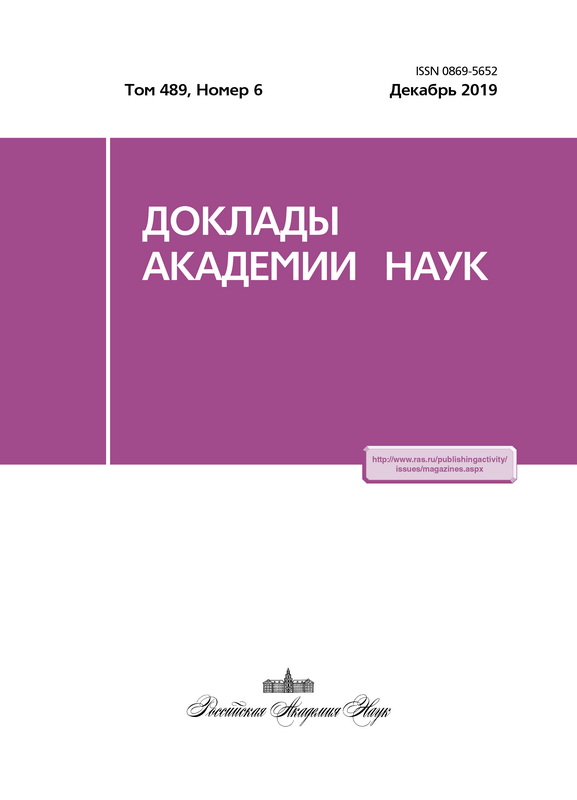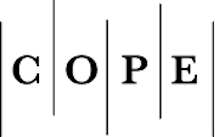Редакционная политика
- Тематика журнала
- Разделы и направления
- Рецензирование
- Периодичность
- Самоархивирование автором
- Индексация
- Этический кодекс журнала
- Плата за публикацию
- Редакционная коллегия
Тематика журнала
«Доклады Академии наук» — один из крупнейших в мире научных журналов, орган Президиума РАН. Основное назначение журнала заключается, прежде всего, в публикации сообщений о крупных научных исследованиях, имеющих приоритетный характер.
«Доклады Академии наук» (ДАН) публикуют краткие сообщения об оригинальных и нигде не опубликованных исследованиях в области математики, естественных и технических наук, авторами которых являются действительные члены Российской академии наук (академики), члены-корреспонденты и иностранные члены Российской академии наук. Сообщения других авторов должны иметь представление от действительного или иностранного члена РАН по соответствующей специальности, полученное до направления статьи в редакцию.
Публикация в ДАН не препятствует впоследствии публикации расширенного варианта в другом периодическом издании.
Журнал переводится на английский язык под названиями:
- Doklady Biochemistry and Biophysics,
- Doklady Biological Sciences,
- Doklady Chemistry,
- Doklady Mathematics,
- Doklady Physical Chemistry,
- Doklady Physics,
- Doklady Earth Sciences.
Назначение «Докладов Академии наук» заключается прежде всего в публикации сообщений о крупных научных исследованиях, имеющих приоритетный характер. Предлагаемое сообщение после изложения постановки задачи должно содержать краткую формулировку, суммирующую основной результат статьи, который, по мнению авторов, удовлетворяет указанному условию и определяет целесообразность публикации именно в ДАН.
В журнале не публикуются: полемические, классификационные и узкоспециальные статьи, содержащие решения стандартных задач; статьи описательные, обзорные и методические (если метод не является принципиально новым); статьи, излагающие обобщения и предположения, непосредственно не вытекающие из публикуемого оригинального фактического материала; статьи серийные и излагающие отдельные этапы исследований, содержащие материал, явным образом разделённый на несколько последовательных публикаций; статьи о рядовых исследованиях, не представляющие общего интереса.
Статьи, поступившие в редакцию, проходят экспертизу членов редколлегии и при необходимости направляются на внешнее рецензирование. Решением редколлегии рукопись может быть отклонена, если она не удовлетворяет перечисленным выше требованиям.
Разделы и направления
Математика
Математическая физика
Информатика
Процессы управления
Вычислительная техника
Теория управления
Физика
Теоретическая физика
Техническая физика
Астрономия, астрофизика, космология
Энергетика
Механика
Химия
Химическая технология
Физическая химия
Геология
Геохимия
Геофизика
География
Океанология
Биохимия, биофизика, молекулярная биология
Клеточная биология
Микробиология
Физиология
Общая биология
Математические методы в естественных науках
Рецензирование
Назначение «Докладов Академии наук» заключается прежде всего в публикации сообщений о крупных научных исследованиях, имеющих приоритетный характер. Предлагаемое сообщение после изложения постановки задачи должно содержать краткую формулировку, суммирующую основной результат статьи, который, по мнению авторов, удовлетворяет указанному условию и определяет целесообразность публикации именно в ДАН.
В журнале НЕ публикуются:
- полемические, классификационные и узкоспециальные статьи, содержащие решения стандартных задач;
- статьи описательные, обзорные и методические (если метод не является принципиально новым);
- статьи, излагающие обобщения и предположения, непосредственно не вытекающие из публикуемого оригинального фактического материала;
- статьи серийные и излагающие отдельные этапы исследований, содержащие материал, явным образом разделённый на несколько последовательных публикаций;
- статьи о рядовых исследованиях, не представляющие общего интереса.
Статьи, поступившие в редакцию, проходят экспертизу членов редколлегии и при необходимости направляются на внешнее рецензирование. Решением редколлегии рукопись может быть отклонена, если она не удовлетворяет перечисленным выше требованиям.
Одобренные редакционной коллегией статьи публикуются по мере поступления. Единственным поводом для внеочередной публикации по решению редколлегии является исключительная важность сообщения или соображения приоритета (журнал выходит каждые 10 дней, т.е. 3 раза в месяц, или 36 раз в год.).
Возвращение рукописи автору на доработку не означает, что она принята к печати. После получения доработанного текста рукопись вновь рассматривается редколлегией. Доработанный текст автор должен вернуть вместе с исходным вариантом, а также с ответом на все замечания. Датой поступления после доработки считается день получения редакцией окончательного варианта.
Не принятые к публикации работы авторам не высылаются.
Статьи, отклоненные редколлегией, повторно не рассматриваются.
Периодичность
Журнал выходит в свет ежедекадно. В течение двух месяцев выходит 6 номеров журнала, объединяемых в один том.
Индексация
Журнал индексируется в наукометрических базах данных:
- Russian Science Citation Index – внешнем модуле Web of Science;
- ядро Российского индекса научного цитирования (РИНЦ - на платформе eLibrary.ru);
Журнал входит в перечень ВАК.
Помимо этого, журнал индексируется следующими ресурсами:
- Google Scholar
- Ulrich's Periodicals Directory
- WorldCat
Этический кодекс журнала
Журнал "Доклады Академии наук" максимально стремится поддерживать принципы добропорядочности и этики в опубликованном контенте.
У журнал "Доклады Академии наук" есть политика конфликтов интересов, и публикуемые в журнале работы соответствуют международным, национальным и/или институциональным стандартам работы с людьми и животными, а также при необходимости используют практику информированного согласия.
Журнал "Доклады Академии наук" придерживается правил Committee on Publication Ethics (COPE) и руководствуется его принципами в отношении того, как бороться со случаями ненадлежащего поведения, тем самым обязуясь расследовать утверждения о ненадлежащем поведении в целях обеспечения этичности исследований.
Журнал "Доклады Академии наук" может использовать программное обеспечение для обнаружения плагиата при проверке представленных рукописей. Если будет выявлен плагиат, журнал будет следовать принципам и рекомендациям COPE в отношении плагиата.
Общие требования к рукописям
При рассмотрении поступивших рукописей редакция руководствуется документами международных этических комитетов.
В случае, если в исследовании принимали участие живые организмы, то редколлегия дополнительно руководствуется
- Хельсинкской декларацией Всемирной Медицинской Ассоциации «Рекомендации для врачей, занимающихся биомедицинскими исследованиями с участием людей;
- Европейской конвенцией о защите позвоночных животных, используемых для экспериментов или в иных научных целях
- Если в экспериментальном исследовании объектами исследования выступали живые люди, авторы должны отразить в рукописи, что все стадии исследования проведены в соответствие с законодательством и нормативными документами. Авторы так же должны предоставить информацию о том, что протокол исследования рассматривался в этическом комитете с обязательным указанием названия комитета (или организации, при котором комитет создан), даты и номера протокола заседания, на котором проведение исследования было одобрено. Редакция вправе потребовать от коллектива авторов заверенные копии соответствующих протоколов.
- В рукописи должно быть отмечено, что от всех людей, ставших объектами исследования, получено добровольное информированное согласие.
- Авторы несут персональную ответственность за то, что в рукописи никаким образом не раскрывается личность участников исследования
- Авторам следует удостовериться, что по представленным в рукописи данным идентифицировать объекты исследования невозможно.
Рукопись будет снята с публикации, если на каком-либо этапе рассмотрения или предпечатной подготовки редакционной коллегией будет выявлено нарушение требований публикационной этики.
Если такое нарушение будет обнаружено читателями после публикации статьи, она будет отозвана. Это повлечет за собой также запрет на будущие публикации в нашем журнале для членов авторского коллектива.
К нарушениям публикационной этики относятся:
- неправомерные заимствования;
- одновременная подача рукописи в несколько журналов;
- сокрытие конфликта интересов;
- оценка профессиональных качеств рецензентов;
- недопустимое авторство.
Неправомерные заимствования
Неправомерные заимствования могут существовать во многих формах — от представления чужой работы как авторской до копирования или перефразирования существенных частей чужих работ (без указания авторства) или до заявления собственных прав на результаты чужих исследований. Неправомерные заимствования во всех формах представляют собой неэтичные действия и неприемлемы.
Авторы рукописей должны представлять полностью оригинальные работы. Упоминания результатов работ других авторов должны сопровождаться ссылками на соответствующие первоисточники (которые подлежат включению в список литературы). Цитирование текста, ранее опубликованного где-либо, должно быть оформлено как ПРЯМАЯ РЕЧЬ (текст нужно заключить в кавычки) с обязательным указанием первоисточника. Включение в рукопись больших фрагментов заимствованного текста недопустимо.
Необходимо всегда признавать вклад других лиц в проведенное исследование. Авторы должны ссылаться на публикации, которые имели большое значение при выполнении научной работы, освещенной в рукописи. Данные, полученные неофициально (например, в ходе беседы, переписки или в процессе обсуждения с третьими сторонами), не должны быть использованы или представлены без ясного письменного разрешения первоисточника. Информация, полученная из конфиденциальных источников (например, о предоставлении гранта на проведение исследования), не должна упоминаться в рукописи без четкого письменного разрешения того из авторов рукописи, кто имеет непосредственное отношение к данным конфиденциальным источникам.
Выявление неправомерных заимствований проводится:
- системой Антиплагиат;
- в рамках научного рецензирования
- после публикации рукописей — по факту обращения читателей с соответствующими заявлениями.
При установлении факта неправомерного заимствования данных (результатов научной работы) или идеи, рукопись (статья) будет отозвана и отклонена от публикации, даже если она уже опубликована. На сайте журнала будет размещено официальное уведомление.
Одновременная подача рукописи в несколько журналов или представление уже опубликованных данных под другим названием
Выявление факта представления одной и той же рукописи одновременно более чем в один журнал будет расценено как нарушение публикационной этики. Рукопись будет отклонена.
Публикация определенного типа статей (например, переводных статей) в некоторых случаях допустима при соблюдении ряда условий. При подаче рукописи для вторичной публикации авторы должны уведомить об этом редакционную коллегию и подробно обосновать целесообразность такой публикации. В случае вторичной публикации урегулирование вопросов, связанных с авторскими правами на публикацию, решается индивидуально в каждом конкретном случае. Общими правилами оформления рукописи для «вторичной» публикации являются:
- указание полной библиографической ссылки на первичную публикацию;
- сохранение оригинальной библиографии первичной работы.
Более подробную информацию о допустимых формах вторичных (повторных) публикаций можно найти на странице www.icmje.org.
Сокрытие конфликта интересов
Все авторы обязаны раскрыть (задекларировать в соответствующем разделе рукописи) финансовые или другие явные, или потенциальные конфликты интересов, которые могут быть восприняты как оказавшие влияние на результаты или выводы, представленные в работе.
Примеры потенциальных конфликтов интересов, подлежащих раскрытию:
- получение финансового вознаграждения за участие в исследовании или написание рукописи;
- какая-либо связь (работа по договору, консультирование, наличие акционерной собственности, получение гонораров, предоставление экспертных заключений) с организациями, имеющими непосредственный интерес к предмету исследования или обзора;
- патентная заявка или регистрация патента на результаты исследования (авторского права и др.);
- получение финансовой поддержки для любого из этапов проведения исследования или написания рукописи (в том числе гранты и другое финансовое обеспечение).
Информация о конфликтах интересов, полученная от авторов рукописей, будет доступна только редакционной коллегии при принятии решения о публикации рукописи. В случае принятия рукописи к публикации, информация о конфликтах интересов публикуется в составе полного текста статьи.
Оценка компетенции рецензента
Оценка профессиональных качеств рецензента является исключительной прерогативой редакционной коллегии.
Попытки авторов давать оценки компетентности рецензентов повлекут за собой отклонение рукописи.
Недопустимое авторство публикаций
Авторами публикации могут выступать только те лица, которые внесли значительный вклад в формирование замысла работы, разработку, исполнение и/или интерпретацию результатов представленного исследования, а также в сам процесс написания рукописи (в том числе проводившие научную и стилистическую правку и оформление в соответствии с требованиями журнала).
Авторы должны удостовериться в том, что:
- все участники, внесшие существенный вклад в исследование, представлены как Соавторы;
- не приведены в качестве Соавторов те, кто не участвовал в проведении исследования;
- все Соавторы видели и одобрили окончательную версию работы и согласились с представлением ее к публикации (подтверждением этого являются подписи всех авторов в сопроводительном письме).
Доступ к исходным данным и их хранение
Редакция оставляет за собой право запросить у Авторов исходные (необработанные) данные исследования, в том числе для предоставления рецензентам и редакторам. Авторы должны быть готовы предоставить такого рода информацию сотрудникам редакции (согласно ALPSP-STM Statement on Data and Databases (ссылка)), а также хранить эти данные.
Существенные ошибки в опубликованных работах
В случае обнаружения существенных ошибок или неточностей в публикации автор должен сообщить об этом редакции Журнала или Издателю и взаимодействовать с редакцией с целью скорейшего изъятия публикации или исправления ошибок. Если редакция или издатель получили обоснованные сведения от третьей стороны о том, что публикация содержит существенные ошибки, автор обязан изъять работу или исправить ошибки в максимально короткие сроки либо опровергнуть заявление о наличии ошибок, представив в редакцию необходимые доказательства.
Плата за публикацию
Статьи в журнале «Доклады академии наук» публикуются бесплатно для всех авторов.
Редакция не взымает с авторов платы за размещение статей в открытом доступе, рецензирование, подготовку журнала к печати, а также содержание сайта и электронное депонирование рукописей.
Редакционная коллегия
- Владимир Евгеньевич Фортов (главный редактор)
- С.Н. Васильев (заместитель главного редактора)
- С.М. Алдошин
- А.Ф. Андреев
- О.А. Богатиков
- В.А. Васильев
- В.И. Васильев
- Г.П. Георгиев
- Г.С. Голицын
- А.И. Григорьев
- Ю.В. Гуляев
- Н.Л. Добрецов
- В.П. Дымников
- С.В. Емельянов
- М.В. Иванов
- Ю.М. Каган
- М.П. Кирпичников
- В.В. Козлов
- А.И. Коновалов
- В.М. Котляков
- В.В. Кузнецов
- В.А. Левин
- В.А. Матвеев
- И.И. Моисеев
- Н.Ф. Морозов
- В.В. Осико
- М.А. Островский
- Д.С. Павлов
- Р.В. Петров
- В.П. Платонов
- А.И. Русанов
- Г.И. Савин
- Е.Д. Свердлов
- А.Н. Скринский
- М.В. Угрюмов
- А.Р. Хохлов
- А.Ю. Цивадзе
- А.М. Черепащук.






